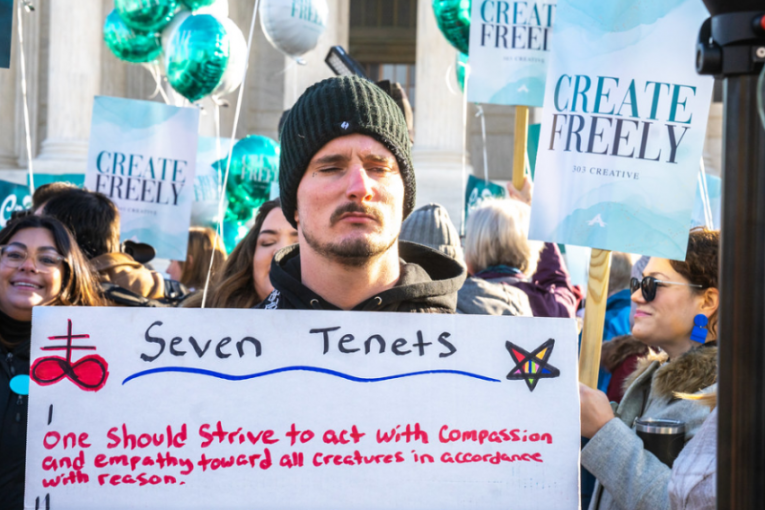

COLORADO – On June 30, 2023, the Supreme Court case 303 Creative LLC v. Elenis sparked public controversy and discourse. However, its origin dates back to September of 2016.
Lorie Smith, a website designer of 303 Creative, was looking to expand her business to designing wedding websites, but not for same-sex couples, as it went against her Christian values. However, Colorado’s Anti-Discrimination Law, which “guarantees equal access to public accommodations”, made Smith fearful of the legal ramifications associated with this denial.
On September 20th, she asked a U.S. District Court in Colorado to preemptively give her a ludicrous “license to discriminate in the marketplace”. Because she was not technically in the wedding design market yet, this license was not given. However, a day after her loss she controversially claimed she had received a request from a Stewart, a homosexual man, to design his wedding website.
With this new piece of evidence, Smith and her conservative legal representative, Alliance Defending Freedom, eventually appealed the District Court decision up to the Supreme Court. They won the case with a staggering 6-3 decision.
However, it was later revealed that “Stewart,” who was used as one of the case’s main pieces of evidence, never reached out to 303 Creative. Though his contact information used in the fraudulent request for wedding website help was accurate, he told a reporter of The New Republic that he was not only married to a woman and had a child, but he was also a wedding website designer.
This case is very unsettling, partially because as Colorado Attorney General Phil Weiser described it, it can be perceived as a “made-up case” with potentially made-up evidence.
However, what is more dissatisfying about this case is the fact that Smith referred to the First Amendment as legal support for her argument. She claimed that her right to freedom of speech would be breached if she was not given the ability to discriminate against homosexual customers. However, if that is conceded, one has to acknowledge that the 14th Amendment and the equal protection under the law afforded to homosexual couples by it are also violated.
Though the morality of this case is rather unambiguous, both arguments are legally valid to a degree.
The 6-3 decision of the Supreme Court was not random. The inherently vague and broad nature of laws allows for them to be used and interpreted in a way that can be favorable to almost any position one wishes to take, no matter its morality. As one can assume, the knowledge that at least one law can be used to provide constitutional validity for any argument can be a virtuous or a dangerous thing, depending on the circumstance.
Though there are likely numerous courses of action that could be taken to ensure that laws and morality (assuming morality is something that can be agreed upon) accurately reflect each other, it may be beneficial to ponder if it is even worth trying to seek a solution in the first place.
Regardless, cases like 303 Creative LLC v. Elenis are dangerous because they set precedent for future cases. There are currently 29 states that have laws defending the LGBTQ+ community’s basic right to public accommodation. However, this case implies that the highest court in the United States can openly tolerate inequality and ignore the protections afforded to U.S. citizens by the 14th Amendment.
Considering this precedent, attacks on other marginalized groups, not solely the LGBTQ+ community, are not inconceivable. Now, more than ever, it is essential that we educate ourselves on how to challenge individuals with authority whose decisions are not reflective of society’s values.





Still more right wing SCOTUS corruption and lies. As usual I bring receipts.